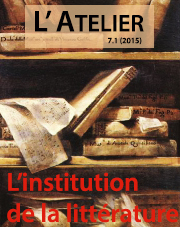La scolarisation du poète américain, de Longfellow à Dickinson
Abstract
Cet article se propose d’analyser le passage de la poésie américaine de l’école à l’université entre la fin du XIXe et le début du XXe siècle. En interrogeant les discours qui ont permis successivement à l’école et à l’université américaines de se prévaloir de Longfellow ou de Dickinson comme adjuvants à leurs missions respectives, l’article lie la canonisation de ces poètes américains au rôle de « personnage pédagogique » qu’ils étaient amenés à jouer à l’intérieur de l’institution. La scolarisation du poète ne désigne donc pas seulement l’intégration de son œuvre aux programmes des écoles et des universités, mais, préalablement à cette intégration, la capacité du poète lui-même à incarner une fonction scolaire, à devenir soit celui qui s’éduque soit celui qui instruit. Alors même que la critique universitaire cherche à distinguer son expertise d’une première réception immature de la littérature américaine, elle va pourtant recourir elle aussi à cette scolarisation du poète, et c’est alors l’infantilisation d’Emily Dickinson chez le critique Allen Tate qui pose particulièrement question, dans la mesure où elle va révèler un recours détourné aux configurations amateures de la poésie américaine que Tate, dans son appel à un New Criticism, cherche précisémment à révoquer.
Commenting on the delayed recognition of American literature by the American university, this article dwells on the efforts displayed by academic critics at the beginning of the twentieth century to make American poetry a respectable and serious area of study by dissociating it from the childishness with which it had been read at school. Studying the ways in which both educational sites framed the importance of American poets, this article looks at the roles played by Longfellow at the end of the XIXth century and Dickinson at the beginning of the XXth as they each enabled the institutions which promoted them. Authorizing the very discourses in which they were valued, the canonical status of these poets is linked to the « pedagogical persona » they were made to play, so that their institutionnalization really depended on how they were « schooled », be it by playing the part of the instructed or the instructor. This pedagogical role-playing remains crucial even within the newly-founded academic criticism, which strives to promote its expertise by demoting the immature responses which American literature had solicited in the past. The paradoxes which this entails are fully revealed when looking at Allen Tate’s criticism on Dickinson, where the poet’s infantilization denotes the ongoing influence of amateur appreciations of her work, even while the author’s call for a New Criticism would revoke them.
Published
Issue
Section
License
- Work submitted for publication must be original, previously unpublished, and not under consideration for publication elsewhere. If previously published figures, tables, or parts of text are to be included, the copyright-holder's permission must have been obtained prior to submission.
- Authors of accepted manuscripts will assign to L'Atelier the right to electronically distribute their article, or publish it in any form (Internet, CD ROM, printed copy) but authors will retain copyright and, after the article has appeared in L'Atelier, authors may republish their text (in print and/or electronic form) as long as they clearly acknowledge L'Atelier as the original publisher.


